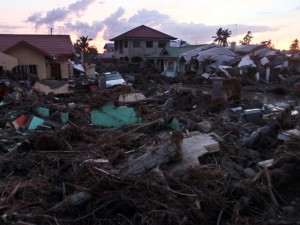“The overflowing generosity of the Filipino people is saving lives,” a key United Nations official in Manila said—but more needs to be done for the victims and survivors of Tropical Storm “Sendong.”
As foreign and local aid continued to stream in a week after the deluge, the United Nations on Thursday launched the Philippines (Mindanao) Humanitarian Action Plan 2012, an appeal to the international community to provide an additional $28.6 million (about P1.26 billion) to the relief effort.
The target is to “provide food, clean water for drinking and bathing, emergency shelter, and essential household items to 471,000 worst-affected people in the cities of Cagayan de Oro and Iligan for three months,” according to Dr. Soe Nyunt-U, acting head of the local UN Office for the Coordination of Humanitarian Affairs (Ocha).
“The needs are overwhelming,” Soe said in a news conference at the Ocha headquarters in Makati City.
“In the Philippines, this is the most festive time of the year when families come together and celebrate life. Please extend your support to those who have been deprived of this traditional celebration. Your contribution can make a difference,” he said.
‘Ill-prepared’
Soe said Ocha expected to receive commitments in the next few weeks, if not days, from the more than 190 UN member-states and international donor organizations like the World Bank and the Asian Development Bank.
The Philippine government had accepted the offer, he noted.
Assessments made by the government and the Ocha in the disaster areas “showed a population ill-prepared to deal with the scale of the disaster, and local response capacities struggling to cope with the unexpected needs,” he said.
Debris clearing would be among the top priorities to reduce health risks and ensure the uninterrupted delivery of life-saving programs, he added.
Ahead of Soe’s announcement, the UN Emergency Relief Office on Tuesday announced the release of a $3-million grant for the flood victims.
European Union
The 27-member European Union is giving 3 million euros (about P173 million). “The funds will be used primarily for debris cleanup, food assistance, temporary shelters, medical assistance, water and sanitation and protection,” said the EU office in Makati City.
Australia is also donating A$1.3 million (about P55 million), according to its embassy in Makati City. Australian Ambassador Rod Smith said Canberra “stands ready to help Filipino families affected by this disaster get back on their feet.”
Japan turned over P14 million worth of emergency relief goods to the Department of Social Welfare and Development (DSWD). These included water tanks, generators, tents, sleeping mattresses, blankets and other items needed at the evacuation centers.
The Chinese Embassy in Manila donated at least P440,000, while the Spanish Cooperation Agency for International Development granted 900,000 euros (P52 million) in emergency humanitarian assistance.
Malaysia
Malaysia donated $100,000 (P4.3 million), Philippine Ambassador J. Eduardo Malaya said Thursday in a report from Putrajaya.
“This modest contribution will, at the very least, ease the burden of the affected government to rehabilitate and reconstruct the areas affected by the destructive floods,” Malaya quoted Malaysian Foreign Minister Dato Sri Anifah Aman as saying during the turnover of the fund.
Earlier, the Filipino-Malaysian community in Kuala Lumpur forwarded $1,000 to the flood victims through the Philippine Red Cross.
Also on Thursday, the Taipei Economic and Cultural Office (Teco) handed a check for $150,000 (P6.5 million) to the DSWD, Social Welfare Secretary Corazon Soliman said.
The department had received tents and hygiene kits from the Unicef, and also energy biscuits and rice from the World Food Program. More tents would be coming from the UN High Commissioner for Refugees, Soliman said.
In a briefing on Wednesday, Foreign Secretary Albert del Rosario said more than a dozen countries have offered various forms of aid.
These also included the United States, Canada, Russia, South Korea, Turkey, Germany, the United Kingdom, Singapore and Indonesia, as well as the Organization of Islamic Countries.
“The world, in general, is responding in an altruistic manner” to the latest disaster that hit the country, Del Rosario said in a briefing.
ADB grant
The Asian Development Bank (ADB) said it would provide a $3-million (P131-million) grant to the relief effort and assured the government of continued support in the reconstruction and rehabilitation phase.
“As a development partner of the Philippines, we are extending immediate help to poor families that have borne disproportionate impact of the disaster during this festive season,” Neeraj Jain, ADB’s country director for the Philippines, said in a statement.
The $3-million grant will come from the bank’s emergency facility, the Asia Pacific Disaster Response Fund, which provides quick-disbursing grants to help restore essential life-saving services following major natural disasters.
Contacting Unicef
The Unicef said it had dispatched supplies to the affected areas including water and hygiene kits containing soap, toothbrushes and personal items.
Apart from tents and tarpaulins for temporary shelter, it was also providing vitamin A for mothers and infants, breast-feeding education materials to reduce the risk of infant mortality and recreation kits for children, the UN agency said.
Donors who wish to contact Unicef Philippines may log on to www.unicef.ph or https://donate.unicef.ph, call (632) 758-1000 or (632) 758-1442, or check out its accounts in Facebook (Facebook.com/unicefphilippines) and Twitter (Twitter.com/unicefphils).
For local wire transfers, donations may be deposited to Unicef Philippines’ Metrobank account: Unicef C/A No: 066-7-06631209-3, and for international transfers: Unicef C/A no: 066-7-00141392-5 with Swift Code: MBTCPHMM.
Corporate donations may be coursed through George Belardo at gbelardo@unicef.org or +639178844982. With a report from TJ Burgonio
